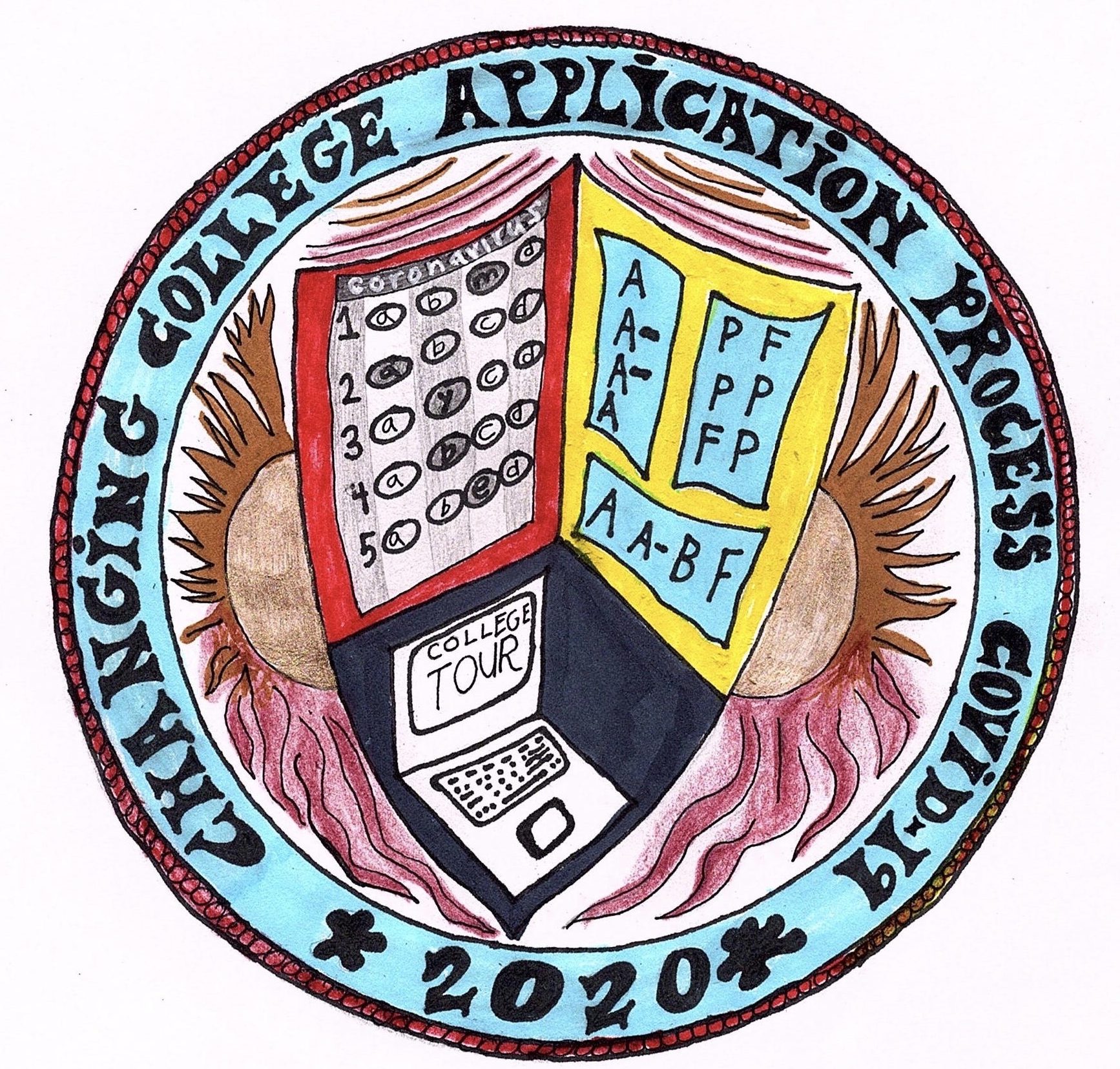The class of 2021 is facing drastic changes to their college application process due to the COVID-19 pandemic. With the loss of SAT scores, standard grading systems, accessibility to extracurricular activities, athletic recruitment tournaments, and even the ability to visit prospective schools, students and admissions committees alike will have to reconsider the “ideal applicant.”
After having to close many testing centers for the March SAT–which meant that only some
students were able to test– the College Board officially canceled the May and June test dates. In an email to students registered for the June test, the College Board promised to have more testing dates and centers than usual in the late summer and fall, including a September SAT. The April ACT was rescheduled to June and has yet to be canceled.
In an official statement from the University of California, announcing that all schools in the system would be going test-optional for the following year, president Janet Napolitano said that “the University’s flexibility at this crucial time will ensure prospective students aiming for UC will get a full and fair shot–no matter their current challenges.”
The University of California schools are not the only ones making this change. Colleges
and universities across the country, from Cornell to Texas Christian to Amherst to Tulane, have made the decision to waive the SAT/ACT requirement for applicants in the class of 2021.
Krista Klein, Co-Director of College Counseling at Lick, hopes that many of these schools remain test-optional in the future. Not requiring test scores “is kind of a ‘win-win’ for everyone,” she says. “If you’re a strong test-taker, then you can submit scores and they will help you out. If you’re not, then you don’t need to worry about them, and the college will simply use everything else in your application to evaluate your candidacy.”
Admissions committees will also have to adjust their reading process for different types
of grades this semester. Given the difficulties and inequities relating to distance learning, many schools have abandoned the typical letter scale and changed how they
assess their students. Even within the San Francisco independent school community, there are different approaches: assignments due after March 12 cannot lower Lick students’ grades, University High School students can either obtain an A or an A-minus for the semester and teachers at the Urban School of San Francisco will be grading their students on a four-letter scale of A, A-minus, B, and F.
Summer activities, as well, such as jobs, internships, pre-college courses and travel programs, have drastically changed this year. Many students cite participation in such programs in an attempt to distinguish themselves in their applications. For college applicants, the spring and summer before senior year are typically times of great personal growth, whether it be through learning new skills, gaining leadership experience or delving into a passion. With many of their plans canceled for the next few
months, students will have to find new ways to stay engaged.
Klein is not worried, however. “Colleges want to fill their campuses with deep, real human beings,” she says. “Sometimes our students–in their ambition to become strong college candidates–have lost themselves in the frenzy.” In an email to the junior class, Klein and the other members of Lick’s college counseling team said that this could be a great “opportunity for students to slow down, be reflective, and have space to learn more about themselves,” which can be very attractive to colleges as they try to select thoughtful and self-aware candidates.
Being an impressive applicant is only half the battle, however. Students need to pick the school that is the best fit for them, which can be challenging when they are unable to visit campuses. Many schools are offering virtual campus tours and information sessions for prospective students, but according to Bridget Martin ’21, these online resources do not emulate the real thing. Being on a campus is “not the same as looking online,” she says. “It’s hard to see yourself somewhere just from a website.”
One of the many decisions that students make throughout the college process is whether or not to apply Early Decision to a school. With a typical November application deadline instead of the traditional January date, admission resulting from an Early
Decision application is binding, and there is little opportunity to negotiate financial aid. Due to the certainty of enrollment, however, students generally have a higher chance of being admitted when they apply this way. Initially, when asked about possibly applying Early Decision to a school, Martin said that it was something she was considering. Now, having not been on the campus of most of the schools she is looking at, she is uncomfortable making a possibly binding decision.
For Audrey Gallagher ’21, a student-athlete hoping to play water polo in college, the
process is even more uncertain. Getting recruited to play a sport in college differs greatly depending on the athlete and their chosen sport, but for Gallagher, the main events were supposed to take place during the late summer and early fall of 2020.
The majority of water polo recruiting happens at the USA Water Polo Junior Olympic
Championships. The tournament was scheduled for the end of summer but was postponed to December. Because the Junior Olympics will now take place after the recruiting process ends, Gallagher says, coaches “probably won’t get another opportunity to see me play in person.”
When college water polo teams are in town for games against local teams, prospective students often meet with coaches on the pool deck to discuss recruitment. Because of
COVID-19, many teams will not be traveling as far, which means that Gallagher–and other players on the West Coast–won’t have as much contact with schools on the East Coast.
When Gallagher’s athletic season starts up in the fall, it seems like the main way she will be recruited is through video footage of her playing, which means that she has to be on her A-game. However, Gallagher doesn’t have access to a pool during Shelter-In-Place, just like other athletes might not have access to a track, a field, a court, or a gym. “It’s important to be in really good shape during the recruiting process, so that’s another hurdle.”
With stocks plummeting and millions losing jobs due to COVID-19, the financial
burden of college may seem like too much for some families. But financial aid packages have yet to change, so families should not have to worry about paying more than expected for education. According to 2016 data from the U.S. Department of Education’s National Center for Education Statistics, 72% of undergraduate students received some sort of financial aid throughout the school year. Klein says that families were able to appeal to colleges for more aid if they were hit by the financial crisis, but that she is not aware of any Lick students having to take this step. “One thing we did notice, though, was movement off the waitlists for full-pay students,” Klein says. Financial aid packages are not being revoked, but students who are able to pay full tuition are being prioritized as schools finish filling the spots for the incoming class.
The common theme that admissions officers, recruiters, and college counselors share is
that everyone is going through the same thing. Everyone is waiting on the SAT, everyone’s summer plans were cancelled, everyone is experiencing high school in a brand new way. Yet some were hit harder by COVID-19 than others, due to sickness, financial struggle and countless issues that come from the necessary shelter-in-place orders.
As the college process starts for the class of 2021, admissions committees will have to learn to evaluate students in a different light–based not on test scores, GPA and accolades, but on personality, sense of self and the ability to turn a hopeless situation into a meaningful one.






